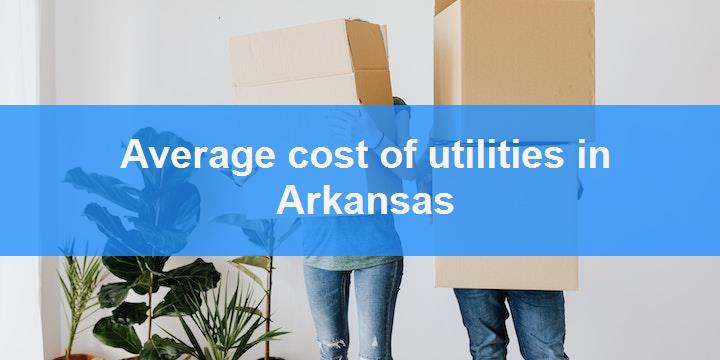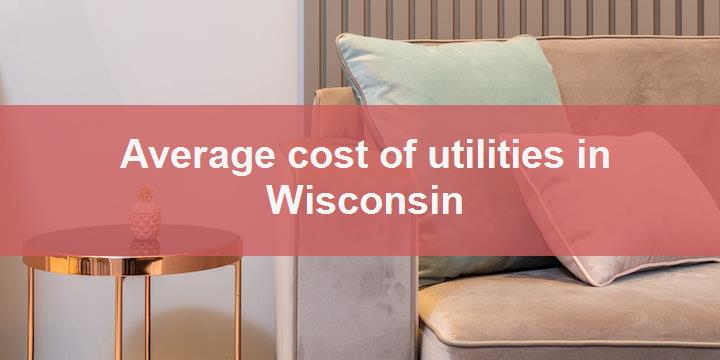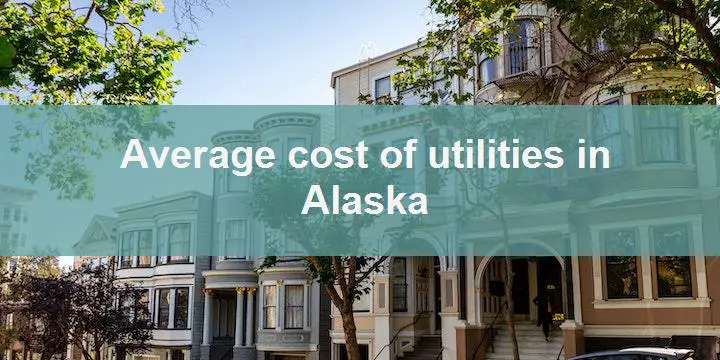Evaluating the average cost of utilities in Arkansas is crucial for residents looking to manage their monthly budgets effectively. For a typical family of three living in a single-family home with standard appliances used year-round, the average cost of utilities in Arkansas is $567.41 in 2025. Arkansas’ climate, featuring hot summers and mild winters, plays a significant role in determining utility expenses. This article provides detailed insights into utility costs for various household setups and seasons, offering a comprehensive understanding of what to expect in Arkansas.
Average Electric Bill in Arkansas
Understanding the average electric bill in Arkansas is key to managing household expenses efficiently. For a family of three living in a single-family home, the average electric bill in Arkansas is $124.29 in 2025. The state’s climate, characterized by hot, humid summers and mild winters, significantly impacts electricity usage and costs. The average bill is calculated by considering both winter ($149.46) and summer consumption ($99.11).
Energy Cost Comparison: Arkansas vs. Louisiana
To provide valuable insights into energy costs, the table below compares the electricity expenses for a large single-family home with four people during the summer in Arkansas and Louisiana. This comparison highlights how energy consumption and costs differ between these neighboring states.
| Criteria | Arkansas | Louisiana |
|---|---|---|
| Total Consumption (kWh) | 862.12 kWh | |
| Electricity Rate (cents/kWh) | 12.28 ¢/kWh | 11.69 ¢/kWh |
| Estimated Monthly Cost | $105.87 | $100.78 |
| Detailed Cost Breakdown | ||
| Base Usage: 412.12 kWh | $50.61 | $48.18 |
| Refrigerator: 120 kWh | $14.74 | $14.03 |
| Air Conditioner: 240 kWh | $29.47 | $28.06 |
| Clothes Dryer: 90 kWh | $11.05 | $10.52 |
| Arkansas estimated monthly cost is higher than Louisiana by 5.05%. | ||
Historical Trends in Electricity Prices
The historical chart above illustrates the electricity price trends for large single-family homes in Arkansas during the summer, providing valuable insights into price fluctuations over time. Understanding these historical trends can help residents anticipate future costs and plan their budgets accordingly.
Electricity Cost Comparison Across Various States
This table offers a comprehensive comparison of electricity costs across different states, considering various household types and seasons. It provides a broad perspective on utility expenses.
| State | People | Household Type | Season | Appliances | Electric Monthly Bill |
|---|---|---|---|---|---|
| New York | 3 | One-bedroom apartment | Summer | Fridge, AC, Dryer |
$148.77 |
| California | 4 | Single-family large | Winter | Heater, Dryer, Fridge |
$407.08 |
| Texas | 3 | Townhouse | Winter | Heater, Dryer, Fridge |
$168.56 |
| Florida | 3 | Single-family small | Summer | Fridge, AC, Washer |
$102.05 |
| Illinois | 4 | Two-bedroom apartment | Summer | Fridge, AC, Washer |
$99.77 |
| Georgia | 2 | Studio | Winter | Heater, Fridge |
$123.20 |
| Arkansas | 2 | Townhouse | Summer | Fridge, AC, Washer |
$81.36 |
For a more detailed and personalized utility expense estimate, visit our Electricity Bill Calculator. Adjust the parameters to match your household specifics and get an accurate estimate tailored to your needs.
Average Gas Bill in Arkansas
Effectively managing household expenses in Arkansas includes understanding the average gas bill. For a family of three living in a single-family home, the average gas bill in Arkansas is $197.80 in 2025. Arkansas’s climate, characterized by hot summers and mild winters, significantly influences gas consumption and costs. The average bill is determined by evaluating both winter ($289.73) and summer usage ($105.87).
Arkansas vs. Missouri: A Summer Gas Usage Comparison
To provide a clearer understanding of gas expenses, the table below compares gas costs for a large single-family home with four people during the summer in Arkansas and Missouri. This comparison highlights differences in energy consumption and pricing between the two states.
Gas Bill Comparison Overview
| Criteria | Arkansas | Missouri | Avg. USA |
|---|---|---|---|
| Total Consumption (MCF) | 6.99 MCF | ||
| Gas Rate ($/MCF) | $18.09 | $23.06 | $17.73 |
| Estimated Monthly Cost | $126.49 | $161.24 | $123.97 |
| Appliance Cost Breakdown | |||
| Outdoor Grill | $9.99 | $12.73 | $9.79 |
| Water Heater | $73.23 | $93.35 | $71.77 |
| Gas Stove | $16.64 | $21.22 | $16.31 |
| Gas Oven | $26.63 | $33.94 | $26.10 |
| Arkansas's estimated monthly cost is lower than Missouri by 21.55%. | |||
| Arkansas's estimated monthly cost is higher than the Avg. USA by 2.03%. | |||
Comparing gas usage between Arkansas and Missouri during the summer offers insights into how climate and household setups affect energy costs. This table provides a clear and data-driven overview of these differences.
The historical chart below illustrates gas price trends for large single-family homes in Arkansas during the summer, offering valuable insights into how prices have fluctuated over time.
By analyzing these historical trends, residents can anticipate future gas prices and develop effective budgeting strategies to manage their household expenses efficiently.
Gas Cost Comparison Across Various States
Here is a detailed comparison of gas costs across different states, considering various household types and seasons. This table offers a comprehensive view of utility expenses.
| State | People | Household Type | Season | Appliances | Gas Monthly Bill |
|---|---|---|---|---|---|
| New York | 3 | Townhouse | Summer | Water heater, Stove, Oven |
$88.71 |
| Florida | 2 | Studio | Summer | Water heater, Stove, Oven |
$82.41 |
| Vermont | 4 | Single-family small | Winter | Gas heating, Dryer, Oven |
$298.95 |
| Texas | 3 | Townhouse | Winter | Gas heating, Dryer, Oven |
$279.14 |
| Illinois | 3 | Single-family small | Summer | Water heater, Stove, Oven |
$79.83 |
| South Carolina | 4 | Single-family large | Summer | Water heater, Stove, Oven |
$134.85 |
| Michigan | 2 | Studio | Winter | Gas heating, Dryer, Oven |
$99.20 |
This comparison table offers a broad perspective on how gas costs vary across different states and household setups, helping you make more informed decisions about your energy usage.
For a detailed and personalized utility expense estimate, explore our Gas Bill Calculator. Customize the parameters to fit your household specifics and get an accurate estimate tailored to your needs.
Average Water and Sewer Fees in Arkansas
When considering a move or investment in Arkansas, understanding the cost of utilities, such as water and sewer fees, is crucial. From my 20 years of experience in real estate, I know these costs can significantly influence your decision. In 2025, the average amount for water and sewer fees in Arkansas is $46.00, making it an attractive option for many homeowners and investors.
State Comparison
To give you a broader perspective, here’s how Arkansas’s water and sewer fees compare with those in eight other states:
| State | Average Water and Sewer Fees |
|---|---|
| Texas | $57.00 |
| Louisiana | $51.00 |
| Mississippi | $43.00 |
| Oklahoma | $45.00 |
| Missouri | $59.00 |
| Tennessee | $63.00 |
| Alabama | $70.00 |
| Kentucky | $69.00 |
Arkansas’s fees are notably competitive, particularly when compared to states like Texas and Louisiana, where utility costs tend to be higher.
Rainwater Harvesting Benefits
In Arkansas, utilizing rainwater harvesting can be a smart way to reduce water costs while promoting sustainability. Here’s why it’s beneficial:
- Cost Savings: Collecting and using rainwater for non-potable purposes, such as irrigation and outdoor cleaning, can significantly lower your monthly water bill.
- Environmental Impact: Reducing reliance on municipal water sources helps conserve local water supplies and minimizes strain on infrastructure.
- Self-Sufficiency: Having a personal water reserve can be crucial during droughts or municipal water restrictions.
Efficient Landscaping Tips
Optimizing water usage for landscaping is essential in Arkansas, where summers can be hot and dry. Consider these strategies:
- Native Plants: Choose plants native to Arkansas, as they require less water and are more resistant to local weather conditions.
- Mulching: Applying mulch around plants helps retain soil moisture, reducing the need for frequent watering.
- Smart Irrigation: Install drip irrigation systems to deliver water directly to plant roots, minimizing evaporation and runoff.
Water Quality Assurance
Arkansas is committed to maintaining high water quality standards, ensuring that residents have access to clean and safe drinking water. This reduces the need for costly water filtration systems and enhances overall public health.
Conclusion
Drawing from my extensive real estate experience, I can confidently say that Arkansas’s reasonable water and sewer fees, combined with efficient water conservation practices and high water quality, make it an excellent choice for homeowners and investors. Our team is dedicated to providing expert advice and support to help you make well-informed real estate decisions. Choosing Arkansas means embracing a state that prioritizes both affordability and sustainable living.
Garbage/Trash Removal Costs in Arkansas
In Arkansas, understanding the costs associated with garbage and trash removal is crucial for effective budgeting. The average cost for garbage and trash removal services in Arkansas in 2025 is around $22.00. These costs can vary based on factors such as service provider, frequency of pick-ups, and whether recycling services are included.
Arkansas has diverse waste management practices across its urban and rural areas. Many communities offer curbside recycling programs and yard waste collection, which can influence the overall cost of garbage removal services.
Garbage/Trash Removal Costs Comparison Across States
To provide a broader perspective, let’s compare Arkansas’ average garbage/trash removal costs with those of other states:
| State | Average Cost |
|---|---|
| Arkansas | $22.00 |
| Mississippi | $20.00 |
| Louisiana | $21.00 |
| Texas | $25.00 |
| Oklahoma | $22.00 |
| Missouri | $23.00 |
| Tennessee | $24.00 |
| Alabama | $20.00 |
| Georgia | $23.00 |
| Florida | $24.00 |
From this comparison, it’s clear that Arkansas’s garbage removal costs are competitive, particularly when compared to neighboring states like Louisiana and Texas. Arkansas’s effective waste management practices help keep these costs manageable.
Understanding these costs is crucial for managing budgets effectively. If you have any questions or need further assistance, our team is here to help you navigate your utility expenses in Arkansas.
Internet and Cable TV Expenses in Arkansas
In Arkansas, managing internet and cable TV costs is a key part of household budgeting. The average internet and cable TV expenses in Arkansas in 2025 is around $111.66. Living in the Natural State, I’ve observed how these costs vary based on provider options and regional availability.
Arkansas offers multiple service providers, giving residents several choices. This competition helps maintain affordable pricing while ensuring high service quality.
Here’s a detailed look at the pricing for different providers in Arkansas:
| Provider | Internet Price | Cable TV Price | Bundle Price |
|---|---|---|---|
| Comcast | $57.99 | $68.99 | $112.99 |
| Verizon | $58.99 | $69.99 | $119.99 |
| ATT | $53.99 | $64.99 | $101.99 |
These prices offer a glimpse into available options, helping you choose the best plan for your household needs.
Comparative Information Across States
To provide a broader perspective, let’s compare Arkansas’s average internet and cable TV expenses with those of other states:
- Missouri: $113.66
- Oklahoma: $111.66
- Texas: $114.66
- Louisiana: $111.66
- Tennessee: $116.32
- Mississippi: $114.66
- Alabama: $109.66
- Georgia: $113.66
From this comparison, it’s evident that Arkansas’s internet and cable TV costs are relatively competitive, especially compared to states like Texas and Louisiana. Exploring different providers can help homeowners and renters find the best value.
To get the most from your internet and cable TV services, we recommend comparing different providers and packages. Finding the right balance of cost and service is key to maximizing value. 🌐📺
Home Phone and Mobile Phone Costs in Arkansas
In Arkansas, managing home phone and mobile phone costs is a crucial part of household budgeting. The average home phone and mobile phone costs in Arkansas in 2025 is around 65.66. Living in the Natural State, I’ve observed that these expenses can vary significantly depending on your location and service provider.
Arkansas offers a variety of phone service providers, ensuring that residents have multiple options to choose from. This competition helps keep prices competitive while maintaining high service quality.
Here’s a detailed look at the pricing for different providers in Arkansas:
| Provider | Mobile Phone Price | Home Phone Price |
|---|---|---|
| Verizon | $70.99 | $37.99 |
| ATT | $65.99 | $30.99 |
| T-Mobile | $59.99 | Doesn’t provide |
These prices offer a glimpse into the options available, helping you choose the best plan for your needs.
Comparative Information Across States
To provide a broader perspective, let’s compare Arkansas’s average home phone and mobile phone expenses with those of other states:
- Texas: 64.66
- Louisiana: 64.66
- Mississippi: 65.66
- Tennessee: 68.32
- Missouri: 66.66
- Oklahoma: 63.66
- Kentucky: 68.32
- Alabama: 62.66
From this comparison, it’s evident that Arkansas’s phone costs are relatively moderate, particularly when compared to neighboring states like Texas and Louisiana. This makes it essential to explore different providers to secure the best deals and service options.
To get the best deals on home and mobile phone services, our team always recommends comparing different providers and packages. Finding the right plan tailored to your needs can help optimize costs and improve service quality. 📞📱
In conclusion, staying informed about the latest service offerings and regularly reviewing your phone plan can significantly impact your overall expenses. The telecom market is constantly evolving, so staying updated on new rates and packages ensures you get the best value. Our team updates this article monthly with fresh information, so be sure to check back frequently for the most current insights. 🌟
FAQ
Q: 💡 What is the average monthly electric bill in Arkansas in 2025?
A: The average monthly electric bill for Arkansans in 2025 is approximately $124.29.
Q: 🔥 What is the average monthly gas bill for Arkansans in 2025?
A: The average monthly gas bill for Arkansans in 2025 stands at approximately $197.80.
Q: 🚰 What is the average monthly water and sewer bill in Arkansas in 2025?
A: The average monthly water and sewer bill in Arkansas in 2025 is around $46.00.
Q: 🗑️ What is the average monthly garbage and trash removal cost in Arkansas in 2025?
A: The average monthly garbage and trash removal cost in Arkansas in 2025 is about $22.00.
Q: 📡 What is the average monthly internet and cable TV bill in Arkansas in 2025?
A: The average monthly internet and cable TV bill in Arkansas in 2025 is approximately $111.66.
Q: 📱 What is the average monthly home and mobile phone bill in Arkansas in 2025?
A: The average monthly home and mobile phone bill in Arkansas in 2025 is around 65.66.
Q: 🧾 What is the total average monthly cost of utilities in Arkansas in 2025?
A: The total average monthly cost of utilities in Arkansas in 2025 is approximately $567.41.



